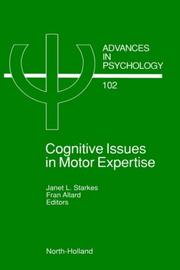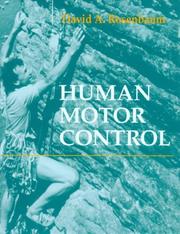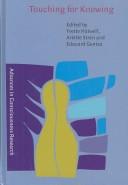| Listing 1 - 10 of 32 | << page >> |
Sort by
|

ISBN: 9780080867564 0080867561 1281778745 9781281778741 9786611778743 9780444893024 0444893024 Year: 1993 Publisher: Amsterdam ; New York : North-Holland,
Abstract | Keywords | Export | Availability | Bookmark
 Loading...
Loading...Choose an application
- Reference Manager
- EndNote
- RefWorks (Direct export to RefWorks)
The intent of this book is to describe those perceptual and cognitive components which contribute to skilled motor performance in a wide variety of disciplines, including sports, microsurgery, video games, and speech. Also considered are issues in the measurement of motor skill, the development of motor skill across the life span, and the importance of individual differences in the development of motor skill. Many chapters contain studies employing the expertise approach used so successfully to study cognitive skills in psychology. Using this approach, expert performers are compared to
Motor ability. --- Expertise. --- Cognition. --- Cognition --- Expertise --- Motor ability --- Psychomotor Performance. --- Sports --- psychology.
Book
ISBN: 0398081778 9780398081775 Year: 1980 Publisher: Springfield Charles C Thomas Publisher, LTD
Abstract | Keywords | Export | Availability | Bookmark
 Loading...
Loading...Choose an application
- Reference Manager
- EndNote
- RefWorks (Direct export to RefWorks)
Children with disabilities -- Education. --- Readiness for school -- Testing. --- Children with disabilities --- Readiness for school --- Education, Nonprofessional --- Psychomotor Performance --- Age Groups --- Persons --- Psychological Phenomena --- Education --- Names --- Sociology --- Psychiatry --- Infant --- Motor Skills --- Child --- Education, Special --- Disabled Persons --- Testing --- Education, Nonprofessional. --- Psychomotor Performance. --- Age Groups. --- Persons. --- Psychological Phenomena. --- Education. --- Names. --- Sociology. --- Psychiatry. --- Infant. --- Motor Skills. --- Child. --- Education, Special. --- Persons with Disabilities. --- Testing.
Book
ISBN: 3764376120 3764376112 Year: 2008 Publisher: Basel : Birkhäuser Basel : Imprint: Birkhäuser,
Abstract | Keywords | Export | Availability | Bookmark
 Loading...
Loading...Choose an application
- Reference Manager
- EndNote
- RefWorks (Direct export to RefWorks)
Active touch perception – also known as haptic perception – is of primary importance for the planning, direction and execution of everyday actions. This most complex of human sensory systems is gaining ever more importance for various scientific disciplines as well as practical industrial applications. In this book an international team of 80 authors presents a comprehensive collection of writings on both aspects of research on human haptic perception. After a theoretical and historical introduction, the chapters are dedicated to neurophysiological basics as well as the psychological, clinical and neuropsychological aspects of haptic perception. Results of studies into human haptic perception in the fields of virtual haptics and robotics are also included. In the final section, contributions from the applied and industrial sectors illustrate the practical uses of knowledge about the human sense of touch. This easily accessible textbook gives not only students, scientists and those with prior knowledge, but also interested laypersons insights into a fascinating area of study that is constantly discovering new challenges and presenting innovative solutions.
Touch --- Tactile sensors. --- Therapeutic use. --- Force sensors --- Touch sensors --- Detectors --- Healing touch --- Imposition of hands --- Therapeutic touch --- Energy medicine --- Therapeutic use --- Neurosciences. --- Psychology, clinical. --- Neurobiology. --- Human physiology. --- Neuropsychology. --- Human Physiology. --- Clinical psychology. --- Psychiatry --- Psychology, Applied --- Psychological tests --- Human biology --- Medical sciences --- Physiology --- Human body --- Neurosciences --- Neural sciences --- Neurological sciences --- Neuroscience --- Nervous system --- Touch Perception. --- Psychomotor Performance. --- Neurophysiology --- Psychophysiology
Book
ISBN: 0124159567 9786613711700 0123914124 1280851341 9780124159563 9780123914125 Year: 2013 Publisher: [Place of publication not identified] Academic Press
Abstract | Keywords | Export | Availability | Bookmark
 Loading...
Loading...Choose an application
- Reference Manager
- EndNote
- RefWorks (Direct export to RefWorks)
Motor control is a relatively young field of research exploring how the nervous system produces purposeful, coordinated movements in its interaction with the body and the environment through conscious and unsconscious thought. Many books purporting to cover motor control have veered off course to examine biomechanics and physiology rather than actual control, leaving a gap in the literature. This book covers all the major perspectives in motor control, with a balanced approach. There are chapters explicitly dedicated to control theory, to dynamical systems, to biomechanics, to different beh
Psychomotor Performance --- Motor skill learning --- Motor ability. --- Motor learning. --- Learning, Psychology of --- Movement, Psychology of --- Physical education and training --- Movement education --- Agility --- Coordination, Muscular --- Dexterity --- Manual dexterity --- Manual skill --- Motor control (Physiology) --- Motor dexterity --- Motor skill --- Motor skills --- Muscular coordination --- Skills, Motor --- Ability --- Kinesiology --- Mechanical ability

ISBN: 0125973004 132205388X 1493304348 0080571085 Year: 1991 Publisher: San Diego (Calif.) : Academic press,
Abstract | Keywords | Export | Availability | Bookmark
 Loading...
Loading...Choose an application
- Reference Manager
- EndNote
- RefWorks (Direct export to RefWorks)
Physiotherapy. Alternative treatments --- biomechanica --- bewegingswetenschappen --- motion --- beweging --- Affective and dynamic functions --- bewegingsstoornissen --- Movement, Psychology of. --- Motor learning. --- Learning. --- Motor Activity. --- Psychomotor Performance. --- 612.8 --- Motor learning --- Movement, Psychology of --- 599.7 --- Bewegingsleer --- Fysiologie --- Motor psychology --- Motion --- Psychophysiology --- Motion study --- Movement education --- Muscular sense --- Motor skill learning --- Learning, Psychology of --- Physical education and training --- Perceptual Motor Performance --- Sensory Motor Performance --- Visual Motor Coordination --- Coordination, Visual Motor --- Coordinations, Visual Motor --- Motor Coordination, Visual --- Motor Coordinations, Visual --- Motor Performance, Perceptual --- Motor Performance, Sensory --- Motor Performances, Perceptual --- Motor Performances, Sensory --- Perceptual Motor Performances --- Performance, Perceptual Motor --- Performance, Psychomotor --- Performance, Sensory Motor --- Performances, Perceptual Motor --- Performances, Psychomotor --- Performances, Sensory Motor --- Psychomotor Performances --- Sensory Motor Performances --- Visual Motor Coordinations --- Motor Activity --- Athletic Performance --- Locomotor Activity --- Physical Activity --- Activities, Locomotor --- Activities, Motor --- Activities, Physical --- Activity, Locomotor --- Activity, Motor --- Activity, Physical --- Locomotor Activities --- Motor Activities --- Physical Activities --- Memory Training --- Phenomenography --- Training, Memory --- Memory Consolidation --- Education --- Zenuwstelsel. Zintuigen. Motorische neurowetenschappen --- Learning --- Psychomotor Performance

ISBN: 902725186X 1588114244 9027251851 1588114236 1282255355 9027296383 9786612255359 1423772296 9781423772293 9789027296382 9781282255357 9789027251855 9781588114235 9789027251862 9781588114242 6612255358 Year: 2003 Publisher: Amsterdam Philadelphia John Benjamins Pub.
Abstract | Keywords | Export | Availability | Bookmark
 Loading...
Loading...Choose an application
- Reference Manager
- EndNote
- RefWorks (Direct export to RefWorks)
The dominance of vision is so strong in sighted people that touch is sometimes considered as a minor perceptual modality. However, touch is a powerful tool which contributes significantly to our knowledge of space and objects. Its intensive use by blind persons allows them to reach the same levels of knowledge and cognition as their sighted peers.In this book, specialized researchers present the recent state of knowledge about the cognitive functioning of touch. After an analysis of the neurophysiology and neuropsychology of touch, exploratory manual behaviors, intramodal haptic (tactual-kinesthetic) abilities and cross-modal visual-tactual coordination are examined in infants, children and adults, and in non-human primates. These studies concern both sighted and blind persons in order to know whether early visual deprivation modifies the modes of processing space and objects. The last section is devoted to the technical devices favoring the school and social integration of the young blind: Braille reading, use of raised maps and drawings, "sensory substitution" displays, and new technologies of communication adapted for the blind. (Series B).
Cognitive psychology --- Philosophical anthropology --- Theory of knowledge --- Physiology of nerves and sense organs --- Touch --- Visual perception --- Perceptual-motor processes --- Sensation --- Perception --- Nervous System Physiological Phenomena --- Musculoskeletal Physiological Phenomena --- Psychological Phenomena and Processes --- Musculoskeletal and Neural Physiological Phenomena --- Mental Processes --- Psychophysiology --- Psychiatry and Psychology --- Nervous System Physiological Processes --- Phenomena and Processes --- Visual Perception --- Psychomotor Performance --- Social Sciences --- Psychology --- Psychological aspects --- Perceptual-motor processes. --- Visual perception. --- Psychological aspects. --- Sensory-motor processes --- Optics, Psychological --- Vision --- Movement, Psychology of --- Visual discrimination
Book
ISBN: 9781493927364 1493927353 9781493927357 1493927361 Year: 2015 Publisher: New York, NY : Springer New York : Imprint: Springer,
Abstract | Keywords | Export | Availability | Bookmark
 Loading...
Loading...Choose an application
- Reference Manager
- EndNote
- RefWorks (Direct export to RefWorks)
This book provides a long-awaited description of a classic motor control theory of action and perception – referent control. Strictly based on experimental material, this theory places action and perception in the context of physical laws to offer solutions of several classical problems in behavioral neuroscience and neurological pathologies. The author re-visits and refines many basic concepts in behavioral neuroscience, including central pattern generators, reflexes, and motor learning. Further, he provides many examples of how task-specific referent control of action and perception can be accomplished by the nervous system. This information may help researchers design theory-driven experiments that address the question of how actions are controlled and how changes in biomechanical characteristics emerge without pre-programming. This book may be interesting to researchers, students in behavioral neurosciences as well as to a broader audience who want to know how action and perception are accomplished by the nervous system.
Biomedicine. --- Neurosciences. --- Human Physiology. --- Medicine. --- Human physiology. --- Médecine --- Physiologie humaine --- Neurosciences --- Neurophysiology --- Neuropsychiatry --- Mind-Body Therapies --- Mental Processes --- Psychological Phenomena and Processes --- Behavior --- Behavior and Behavior Mechanisms --- Complementary Therapies --- Psychiatry and Psychology --- Therapeutics --- Analytical, Diagnostic and Therapeutic Techniques and Equipment --- Perception --- Psychomotor Performance --- Psychophysiology --- Motor Activity --- Medicine --- Health & Biological Sciences --- Neurology --- Neurophysiology. --- Neuropsychiatry. --- Behavioral neurology --- Nervous system --- Physiology --- Biological psychiatry --- Neurobiology --- Human biology --- Medical sciences --- Human body --- Neural sciences --- Neurological sciences --- Neuroscience
Book
ISBN: 9781493922369 1493922351 9781493922352 149392236X Year: 2015 Publisher: New York, NY : Springer New York : Imprint: Springer,
Abstract | Keywords | Export | Availability | Bookmark
 Loading...
Loading...Choose an application
- Reference Manager
- EndNote
- RefWorks (Direct export to RefWorks)
Two recent innovations, the emergence of formal cognitive models and the addition of cognitive neuroscience data to the traditional behavioral data, have resulted in the birth of a new, interdisciplinary field of study: model-based cognitive neuroscience. Despite the increasing scientific interest in model-based cognitive neuroscience, few active researchers and even fewer students have a good knowledge of the two constituent disciplines. The main goal of this edited collection is to promote the integration of cognitive modeling and cognitive neuroscience. Experts in the field will provide tutorial-style chapters that explain particular techniques and highlight their usefulness through concrete examples and numerous case studies. The book will also include a thorough list of references pointing the reader towards additional literature and online resources.
Biomedicine. --- Neurosciences. --- Neuropsychology. --- Medicine. --- Psychology, clinical. --- Médecine --- Neurosciences --- Cognitive neuroscience --- Human behavior models --- Mental Processes --- Models, Theoretical --- Psychological Phenomena and Processes --- Psychophysiology --- Biological Science Disciplines --- Investigative Techniques --- Behavior and Behavior Mechanisms --- Psychiatry and Psychology --- Behavioral Sciences --- Analytical, Diagnostic and Therapeutic Techniques and Equipment --- Natural Science Disciplines --- Behavioral Disciplines and Activities --- Disciplines and Occupations --- Methods --- Physiology --- Behavior --- Neuropsychology --- Psychomotor Performance --- Models, Psychological --- Cognition --- Medicine --- Health & Biological Sciences --- Neurology --- Mathematical models --- Cognitive neuroscience. --- Cognitive neuropsychology --- Cognitive science --- Neural sciences --- Neurological sciences --- Neuroscience --- Medical sciences --- Nervous system --- Neurophysiology
Book
ISBN: 0444887954 9786611760106 1281760102 0080867359 9780444887955 9780080867359 9781281760104 Year: 1991 Publisher: Amsterdam ; New York : New York, N.Y., U.S.A. : North-Holland ; Distributors for the U.S. and Canada, Elsevier Science Pub. Co.,
Abstract | Keywords | Export | Availability | Bookmark
 Loading...
Loading...Choose an application
- Reference Manager
- EndNote
- RefWorks (Direct export to RefWorks)
This volume examines the development of timing in coordinated action from several different ontogenetic perspectives. Some chapters emphasize the qualitative changes in manifest motor behavior during the early growth years and examine the relation between temporal characteristics of pre- and perinatal movements and goal directed actions with qualitatively different rules of temporal organization. Other contributors stress the developmentally invariant timing characteristics of species-typical and perhaps genetically programmed motor patterns of nonhuman organisms.
Motor Skills. --- Movement. --- Psychomotor Performance --- Time Factors. --- 612.8 --- Motor ability --- Motor ability in children --- Motor development in children --- Child development --- Perceptual-motor learning --- Physical education for children --- Agility --- Coordination, Muscular --- Dexterity --- Manual dexterity --- Manual skill --- Motor control (Physiology) --- Motor dexterity --- Motor skill --- Motor skills --- Muscular coordination --- Skills, Motor --- Ability --- Movement, Psychology of --- Kinesiology --- Mechanical ability --- Factor, Time --- Factors, Time --- Time Factor --- Movements --- Motion --- Motor Skill --- Skill, Motor --- Child Development --- physiology. --- Zenuwstelsel. Zintuigen. Motorische neurowetenschappen --- Motor Skills --- Movement --- Time Factors --- physiology --- Motor ability in children. --- Motor ability.
Book
ISBN: 0262513951 0262013843 9786612638312 0262269430 1282638319 0262293463 9780262269438 9781282638310 6612638311 9780262013840 9780262513951 9780262293464 Year: 2010 Publisher: Cambridge, Mass. : MIT Press,
Abstract | Keywords | Export | Availability | Bookmark
 Loading...
Loading...Choose an application
- Reference Manager
- EndNote
- RefWorks (Direct export to RefWorks)
The phenomena of effortless attention, action & the challenges they pose to current cognitive models of attention & action are discussed in this volume.
Attention --- Cognitive neuroscience --- Musculoskeletal Physiological Phenomena --- Mental Processes --- Nervous System Physiological Phenomena --- Psychology, Educational --- Arousal --- Psychological Phenomena and Processes --- Thinking --- Executive Function --- Psychomotor Performance --- Decision Making --- Volition --- Learning --- Psychophysiology --- Musculoskeletal and Neural Physiological Phenomena --- Psychology, Applied --- Psychiatry and Psychology --- Phenomena and Processes --- Human Anatomy & Physiology --- Neuroscience --- Health & Biological Sciences --- Attention. --- Cognitive neuroscience. --- Cognitive neuropsychology --- Concentration (Psychology) --- Flow (Psychology) --- Cognitive science --- Neuropsychology --- Apperception --- Arousal (Physiology) --- Educational psychology --- Memory --- Psychology --- Thought and thinking --- Distraction (Psychology) --- Executive functions (Neuropsychology) --- Interest (Psychology) --- COGNITIVE SCIENCES/General --- COGNITIVE SCIENCES/Psychology/Cognitive Psychology
| Listing 1 - 10 of 32 | << page >> |
Sort by
|

 Search
Search Feedback
Feedback About UniCat
About UniCat  Help
Help News
News